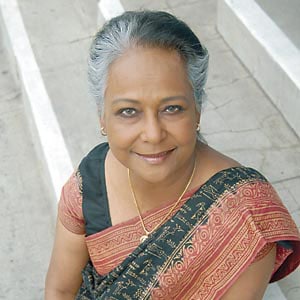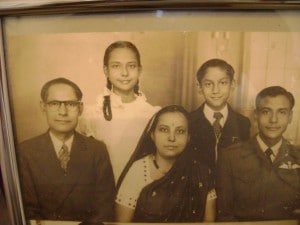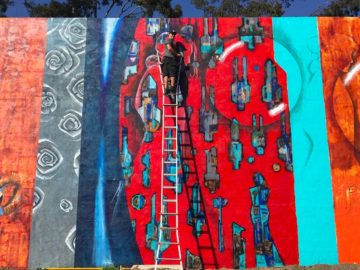
Deepa Biswas Willingham
© Paul Wellman
Deepa Biswas Willingham Addresses The World Bank and the Second Half of Life
BY MELISSA WALKER
PACE Universal is committed to ending trafficking and uplifting communities through the education of girls and women living in extreme poverty – girls who don’t have access to schooling and whose societies devalue and discard them. An education changes girls’ lives. It gives them a future.
Founder Deepa Biswas Willingham spoke to impactmania about her journey, including her early childhood education that began under the stewardship of the woman who later became known as Mother Teresa, and Willingham’s recent speech at The World Bank, in Washington DC, for International Women’s Day.
How did you get started on this journey?

Front row, left to right, Professor Manmatha Nath Biswas, father, Latika Biswas, mother, and Captain Buddho Deb Biswas, brother.
Back row: 14-year old Deepa Biswas, and brother, Dr. Bashker Kumar Biswas.
I grew up with my mother telling me finish the food on your plate, because there are starving children outside the window. And they were. When I would leave my parent’s home everyday to go to school in Kolkata, I would see many of those children out in the streets. Particularly because nobody was taking care of them.
And many, many years ago I told myself that when I grow up I’m going to do something to take care of those little children. That dream never materialized until I was 60. At 40 it didn’t bother me, 50 didn’t bother me. But when I turned 60, I felt miserable, I had lived on this planet and I had used all its resources but I had done nothing to make the planet a better place.
Then I said to myself, you always wanted to do this for the children of your childhood. I talked to my family and to my Rotary Club [Santa Ynez Valley Rotary Club] and said I wanted to go and start a school for girls, because girls are neglected too much, in too many countries. I asked if they would support me, and they said, “Yes!”
Isn’t it wonderful when something grows inside you so much and then you realize it?
Yes, Mother Teresa was my teacher when I was a little girl. Of course that also was at the back of my mind that here is this lady who was a teacher and then eventually became one of the world’s best humanitarians, so what’s my excuse?
Your family’s very involved with worldly events and causes, and you picked it up.
My mother was the motivator. She was a renaissance woman, way ahead of her time in India. She didn’t believe in the caste system. She didn’t believe the service children should not be educated, so that also had a lot to do with it.
And, I came to this country in the 60s. My first husband and I marched with Martin Luther King, Jr. I matured in this country, because I came here in the 60s.
What goals did you set out to accomplish when you founded PACE Universal?
I founded PACE Universal – PACE stands for, Promise of Assurance to Children Everywhere – with two simple mission statements, that it would be mainly a girl’s and women’s empowerment program through education, and that I would set up a model that can be duplicated worldwide.
The PACE board said, “You were born in Kolkata, and Mother Theresa was your teacher. You should do the first one in Kolkata.”
I didn’t think I would have the capability of doing anything bigger than a girl school in a tent for 25 girls – girls who were getting sold at the age of 5 and 6 for prostitution in the village, Piyali Junction, that is 45 kilometers from the Kolkata. It is India’s biggest hub for child trafficking.
Within six months we had 80 girls, and the girls were getting clean water, five days a week. I purposely wanted it to be a day school, because I wanted the fathers to be committed to educating the girls, as well as the mothers. They were getting clean water five days, but on weekends they were drinking dirty water. Every other month I had to give the girls worm medication.
The school became the hub for anything that went wrong in the village, and they came to the school for help. If somebody’s roof blew off straw, we fixed the straw. If somebody’s child had a hole in their heart, then we arranged for open-heart surgery free of cost, etc.
It became the hub, but girls were not remaining healthy, because they were drinking dirty water on weekends. That’s when I first started to put in 17 clean water wells through a grant from Rotary, and this began to expand the program. It’s now a model for Rotarian’s to duplicate elsewhere. People are coming from all over the world to see how we did it. The families that used to earn $1 a day are now earning $3 to $4 a day. They are no longer in abject poverty. It can be done in a very short time.
There are many organizations that focus on girls, India and education. What makes PACE Universal unique?
We have followed Dr. Jeffrey Sachs’ recommendation, “How can one change the face of poverty? One village at a time,” and we proceeded to do something that has the potential to change the planet for the better by tackling trafficking, gender biased abuses, empowering women and uplifting people out of the stronghold of extreme poverty.
The question is how do we get anyone to take us seriously when we have purposely chosen to implement Dr. Sachs’ idea using Piyali Learning Center as the hub to change one village, and not used our funds – about $3 million to date – assets probably valued at $5 million – and moved onto establishing many other simple schools, which we could have done? Instead we followed our mission. There are many many girls schools in the world, but they are not achieving the systemic change that needs to happen in societies deeply engrossed in gender-biased abuses.
Even though the world considers us to be too small to be included in the big playing field, we believe we are doing something that many big players will do well to emulate.
What is needed beside the donations to bring more young girls and women to PACE?
Currently there are 250 girls, and it’s a U-shaped building that houses twelve grades, nursery to grade 12. Our plan is if we can raise the money to build another U-shaped building, then we can take 300 more girls. And if we can build a vocational training center building, then we can set up a spice factory and a jewelry factory, and on the ground floor we’ll set up a village-oriented bank.
The other goal is our girls want to know who they’re going to marry because we want the boys educated, too. So, initially I made a mistake when I only bought three acres of land – I should have bought ten. Because we have been trying to get the adjacent land – another three acres – so that we could set up a boys’ school with one administrative building for both of the areas. But they saw me coming. The first time I paid $30,000 for the first three acres, now it’s close to $1 million.
Land prices are very high in India, but there’s a very nice story. One of the original girl’s fathers, when we took his girl in her father used to be a hawker on the train just selling little trinkets on the train and earning less than $2 a day. But, when we reduced his family expenses by feeding his daughter two meals a day he was very wise, and he saved that money. He put it in a bank and when the money got to a certain level he invested in a little chunk of land. The value went up and now he is a multi-millionaire, a real estate tycoon, and he has been entrusted to find us land.
Gosh, that’s wonderful. So you have someone that remembers where you were in the beginning?
And not just that, he has this really palatial house for himself, his wife, and two children, but he’s donating the ground floor for creating Safe Abode for Education (SAFE). SAFE is essentially board housing for education.
You remember the movie, The Best Exotic Marigold Hotel? They gave me a grant, and an award that said, “Marigold Award For Good.” With that, we have set up his first floor as a dormitory facility for very high risk girls. It is now in operation, and it is one of my biggest success stories.
Can you share another success story in regards to one of the girls?
The first group that came in, we lost a lot lot of them, because they married off young, they were abused, they were sold, this, that, and the other thing.
Two of the first original girls are now taking their 12th grade exam. One of them is named, Dolan, and her life story is like Cinderella’s story.
Her mother died at childbirth and when she first came in she was illiterate. She went from zero literacy to 5th grade reading level in less than nine months – she was genius. But, her father took up with another village woman, got that woman pregnant, and was eventually married to her. The woman hated Dolan – didn’t feed her, didn’t do anything, made her do housework, and didn’t allow her to do homework.
Yet Dolan still succeeded in school – she was that brilliant. Every time I went, she would ask me, “Deeda [grandmother,] can you take me away from my home? And we could not do it, we had no facility.
She eventually took matters in her own hands. She could not continue to live in her home and she found a young man and got married. She’s taking her 12th grade exam, and we are sure she will pass. We will send her to Montessori Training, and she wants to come back and be a teacher at our school.
Another girl gained enough confidence after a few years of education to one day ask a teacher for help because her father was raping her every night. We got involved and got the police out there, but the police, and even the mother, said, “No, she’s making it up.” We insisted and they did a DNA test, and it was her father – we got the father arrested. However, within two weeks, he bribed the police and got out. We had to take that girl away from the whole area, and she is now in another village.
It is heartbreaking to hear that these young girls don’t really have a voice.
No, and that is true for so many girls – 62 million girls are not going to school, or allowed to go to school, worldwide, annually. I am very pleased to hear that our first lady, Michelle Obama, when she leaves the White House, that’s what she wants to work on. And, so is Melinda Gates. All she talks about is educating girls and empowering women.
There is no hope for the planet unless we do that.
What’s the most important lesson that you learned from Mother Teresa?
I was just a girl little girl, and she was my geography teacher. The lesson I learned is to never give up even when you think you are completely in a hopeless situation.
impactmania recently interviewed Robin Hauser Reynolds, who produced and directed the documentary film, CODE: Debugging the Gender Gap, and she talks about the influence that women and minorities have in technology. Are there any business or computer-based vocational skills on the horizon for the PACE school, such as programming and coding?
The problem is, we have a beautiful computer lab, but we don’t have any Internet connection. We can put in a satellite dish, but they want to charge us $1,000 a month for services.
There is also a medical doctor couple and their 10-year old daughter have been to the school several times. The husband and his colleagues want to have the girls do a program of medical dictation, but we can’t implement the program, because we haven’t been able to solve that there are no lines.
You recently spoke at The World Bank headquarters in Washington DC. How was that experience and were you able to generate more support for the mission of PACE Universal?
This was my second trip to The World Bank. There were three women featured. The message I had to share seems to have struck everybody. Partly because the head of World Bank is Dr. Jim Yong Kim, PhD, who categorically says The World Bank should spend money on educating girls and women.
Can you give me some bullet points from your speech?
The topic was featuring women in the second half of their life. I started with the story of starting in my 60s.
I told them the current statistics of the world, that almost half the human population are living on less than $2 a day. Some 2.7 billion people are illiterate, two-thirds of that number are women.
I talked about how Jawaharlal Nehru, the first prime minister of independent India, who said you can tell the condition of a nation by looking at the status of its women.
Women and girls are the biggest sufferers when you have that kind of condition. Women are dispensable in too many places in the world. As Malala Yousafzai says, if you want to fight the Taliban, don’t send guns, send books. They do not like women educated. That’s why they shot her.
You know why this formula works? There is a wonderful African proverb that says, if you educate a boy you benefit an individual, if you educate a girl you benefit a community. Why is that statement true? Because you’ve seen that when you go to a rural area and give education to a boy, you do improve that individual’s life. But boys, as soon as they’re educated, they leave the rural area and go to an urban area to find a better job. Whereas a rural girl, if you give her education — particularly beyond the sixth grade — she marries later and she has less numbers of children. Literate women do not produce illiterate children, and the next generation is improved.
Women nurture, they want their families to live in a better environment. They part of their income, put it back into the community, and soon the community changes. That’s why the formula works, and that’s what we’re trying to do.
Who is your impact maker?
Deepa Biswas Willingham was born and raised in Kolkata (Calcutta). She saw the poverty that crippled her own community and vowed to make a change. Through PACE and the Piyali Learning Center, Deepa has poured every privilege back into the hands of the most vulnerable yet valuable members of society – girls. The result has transformed not just the lives of those girls, but that of entire communities. Willingham’s example is a testament to PACE’s cause. She is proof that when girls are empowered with education, they grow into agents of change for their communities.
Photos courtesy PACE Universal. The World Bank International Women’s Day video courtesy Rotary Club and The World Bank Live. Willingham’s impact maker by Melissa Walker.



